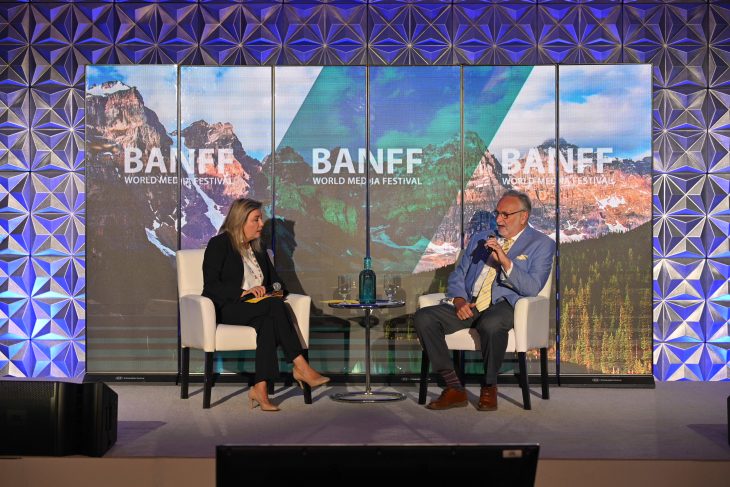
By Bill Roberts
BANFF – One of the more nicely grounded sessions so far at the 2022 Banff World Media Festival (BWMF) featured Ian Scott (above, right), chairperson and CEO of the CRTC, and was moderated by Monika Ille (left), CEO of the Aboriginal Peoples Television Network Inc. (APTN).
APTN has long been concerned that smaller broadcasters like theirs would be at risk under Bill C-11 because they do not possess the market clout to negotiate with online, streaming distributors without CRTC help.
So, it was a nice piece of meaningful and enlightened programming to have the accomplished and trilingual Ille in the driver’s seat.
For his part, Scott, who last month appeared at the Standing Committee on Canadian Heritage stating that Bill C-11 is, put simply, “a much needed piece of legislation,” opened the session with more plain-speak… “the CRTC supports Bill C-11 because the system is broken.” Period!
Scott went on to say “For the last 50 years our system was built on a walled garden approach, that walled garden is gone, it no longer exists… so we (the CRTC) need to get clarity of jurisdiction, data knowledge, and enforcement tools… (luckily) the Commission has already been given provisional resources for implementing C-10 which is now C-11.”
Ille then asked about timelines since “it’s been three years now with C-10 and C-11,” to which Scott replied “the legislation itself calls for a two year transition… and that is reasonable after the first policy directive (from Cabinet)”… and this following an initial 12-18 months to get the first duckies lined up.
Ille pursued her concerns regarding small broadcasters like APTN and Scott expressed an expectation that “good faith negotiations are important… and the CRTC has both mediation and arbitration processes.”
Our moderator then queried the CRTC chair on the June 2019, three phase process to co-develop a new Indigenous broadcasting policy with Indigenous engagement. It resulted in the “What You Said” Report: CRTC Early Engagement Sessions published in 2021; but Ille wanted to know, “after three years, what are the next steps?”
Scott was “proud of the Commission’s efforts on reconciliation… not just the 2019 initiative, but now the second stage broader consultation with all Canadians, and once preliminary (draft) policy is done, the third phase return to Indigenous Peoples with these proposals.”
And so, a new Indigenous broadcasting policy is enroute notwithstanding the Covid pandemic-induced delays that “held us (the CRTC) up for travel, health and safety concerns getting into remote and northern communities… but we did take steps on Northwestel for Northern connectivity as well.”
Ille wisely stayed on message with “to tell Indigenous stories we need a partnership with the CRTC… (and) in 2016 you had a major broadband study, but (again) what has happened?”
Scott carefully took his time on this one. “We’re very close to 90% of all Canadians having 50/10 (megabits per second) service now… but the digital divide remains… only 47% of people in remote and rural areas have access to 50/10 and only 25 or 26 percent in Indigenous communities… but we have invested $209 million in 39 broadband projects (via the $750 million CRTC Broadband Fund) and 50% are Indigenous projects.”
There were a few polite stirrings in the audience on Ille’s next question, “your term is up, coming to an end, what are you doing to assure a smooth transition?”
Without missing a beat, Scott gently volleyed back, “this happens every five years… it’s not about the chair… the CRTC is a prize institution… we have excellent staff and Commission colleagues… it’s a very resilient institution (and) we have many accomplishments over the last five years.”
Examples he provided include greater awareness and responsiveness to Indigenous truth and reconciliation and the Commission’s Harnessing Change report, “which had themes and options you now see in Bill C-11.” (Harnessing Change was published in 2018 and called for “new adaptable and innovative approaches that engage new players.”)
Scott went on to add universal broadband improvements and addressing annoying and fraudulent phone calls to the list of the CRTC’s accomplishments (the latter item constantly charts as the third or fourth largest source of complaints on the CRTC Top Ten!). “And we’ve refined our data collection to be used looking forward vs. dealing with two- to five-year-old historical data,” Scott said.
My sense was Scott had another baker’s dozen of “accomplishment” highlights but we were running out of session time.
Ille did a truly great job moderating, and Scott (a stickler for rules, who apparently cannot meet with an old pal for a pint without drawing flack) can have a well-deserved pint on me at D’Arcy McGees… Cheers!
Bill Roberts is a contributing editor at Cartt.ca.
Photo provided by Banff World Media Festival.



